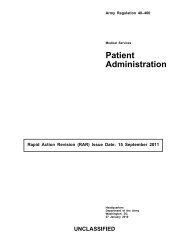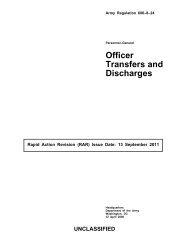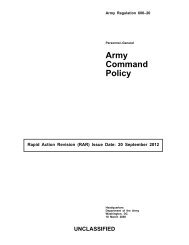Care and Disposition of Remains - Army Publishing Directorate ...
Care and Disposition of Remains - Army Publishing Directorate ...
Care and Disposition of Remains - Army Publishing Directorate ...
You also want an ePaper? Increase the reach of your titles
YUMPU automatically turns print PDFs into web optimized ePapers that Google loves.
. Be not covered by subparagraph a above <strong>and</strong> is placed in a retired status under title 10, chapter 61, during<br />
continuous hospitalization that began while on active duty in the RA.<br />
c. Die while a properly admitted inpatient <strong>of</strong> a medical facility <strong>of</strong> the armed forces located in the United States. The<br />
United States includes Puerto Rico <strong>and</strong> U.S. territories <strong>and</strong> possessions.<br />
d. Die while on an <strong>Army</strong> installation or other <strong>Army</strong> facility, <strong>and</strong> the remains are unclaimed by the decedent’s family<br />
<strong>and</strong> friends <strong>and</strong> refused for disposition by local civil authorities.<br />
e. Die outside <strong>of</strong> the United States. Services provided outside the United States are provided on a reimbursable basis<br />
only.<br />
2–9. Military prisoners, other than enemy prisoners <strong>of</strong> war or interned enemy aliens<br />
Military prisoners are those soldiers that are serving a period <strong>of</strong> confinement adjudged by court-martial. Mortuary<br />
affairs benefits for military personnel are located in table 2–1.<br />
2–10. Enemy prisoners <strong>of</strong> war or interned enemy aliens<br />
Enemy prisoners <strong>of</strong> war are those military members <strong>of</strong> a foreign government’s armed forces engaged in hostilities<br />
against the United States <strong>and</strong> who are captured or held in a place <strong>of</strong> confinement by the United States. Interned enemy<br />
aliens are those civilians who are citizens <strong>of</strong> a country engaged in hostilities against the United states <strong>and</strong> who are<br />
captured or held in a place <strong>of</strong> confinement by the United States. Mortuary affairs benefits for enemy prisoner <strong>of</strong> war<br />
<strong>and</strong> interned enemy aliens are located in table 2–1.<br />
2–11. Indigent persons<br />
Indigent persons are those persons who die while on an <strong>Army</strong> installation or other <strong>Army</strong> facility; <strong>and</strong> whose remains<br />
are unclaimed by the decedent’s family <strong>and</strong> friends, <strong>and</strong> refused for disposition by local civil authorities. Mortuary<br />
affairs benefits for indigent are located in table 2–1.<br />
2–12. Civilian employee <strong>of</strong> the Department <strong>of</strong> the <strong>Army</strong> or the Department <strong>of</strong> Defense<br />
A civilian employee <strong>of</strong> the <strong>Army</strong> or the Department <strong>of</strong> Defense (DOD) is a civil <strong>of</strong>ficer or employee <strong>of</strong> the Department<br />
<strong>of</strong> the <strong>Army</strong> or Department <strong>of</strong> Defense, including an employee <strong>of</strong> an instrumentality wholly owned by the <strong>Army</strong> or<br />
Department <strong>of</strong> Defense, an individual rendering personal service to the United States similar to the service <strong>of</strong> a civil<br />
<strong>of</strong>ficer or employee <strong>of</strong> the United States, without pay or for nominal pay, when a statute authorizes the acceptance or<br />
use <strong>of</strong> the service, or authorizes payment <strong>of</strong> travel or other expenses <strong>of</strong> the individual. Not included are part-time or<br />
intermittent employees or native labor casually hired on an hourly or daily basis (see 5 USC 5561). Mortuary affairs<br />
benefits are located in table 2–1. To be authorized mortuary affairs benefits the employee must be—<br />
a. In a travel status at the time <strong>of</strong> death away from his or her <strong>of</strong>ficial station within the United States or,<br />
b. Assigned to an <strong>of</strong>ficial duty station outside <strong>of</strong> the continental United States <strong>and</strong> death occurs at or while traveling<br />
to or from the <strong>of</strong>ficial duty station or,<br />
c. An employee who has been transported by the <strong>Army</strong> for medical treatment to a medical facility away from their<br />
duty station or,<br />
d. An employee who has been reassigned away from the employee’s home <strong>of</strong> record pursuant to a m<strong>and</strong>atory<br />
mobility agreement executed as a condition <strong>of</strong> employment or,<br />
e. Killed or injured in the performance <strong>of</strong> their duties <strong>and</strong> subsequently die as the result <strong>of</strong> that injury.<br />
f. An employee who is absent without leave at the time <strong>of</strong> death is eligible for mortuary benefits.<br />
2–13. Dependents <strong>of</strong> military personnel<br />
To be eligible for mortuary affairs benefits the sponsor must meet the criteria prescribed in paragraphs 2–2a through<br />
2–2c. Mortuary affairs benefits for dependents <strong>of</strong> military personnel are located in table 2–1. The criteria for<br />
dependents <strong>of</strong> military personnel for mortuary affairs benefits is derived from Federal statutes (10 USC 1072 (2), 1481,<br />
<strong>and</strong> 1485). These statutes define dependents as follows:<br />
a. The spouse.<br />
b. The unremarried widow or widower.<br />
c. A child who—<br />
(1) Has not attained the age <strong>of</strong> 21.<br />
(2) Has not attained the age <strong>of</strong> 23, is enrolled at an institution <strong>of</strong> higher learning approved by the administering<br />
Secretary <strong>and</strong> is or was, at the time <strong>of</strong> the soldier’s or former soldier’s death, in fact, dependent on the soldier or<br />
former soldier for over one-half <strong>of</strong> the child’s support.<br />
(3) Is incapable <strong>of</strong> self-support because <strong>of</strong> a mental or physical incapacity that occurs while a dependent <strong>of</strong> a soldier<br />
or former soldier under clause (1) or (2) <strong>and</strong> is or was, at the time <strong>of</strong> the soldier or former soldier’s death, in fact,<br />
dependent on the soldier or former soldier for over one-half <strong>of</strong> the child’s support.<br />
d. A parent or parent-in-law who is or was, at the time <strong>of</strong> the soldier’s or former soldier’s death, in fact, dependent<br />
on the soldier for over one-half <strong>of</strong> the parent’s support <strong>and</strong> residing in the soldier’s household.<br />
20 AR 638–2 22 December 2000
















